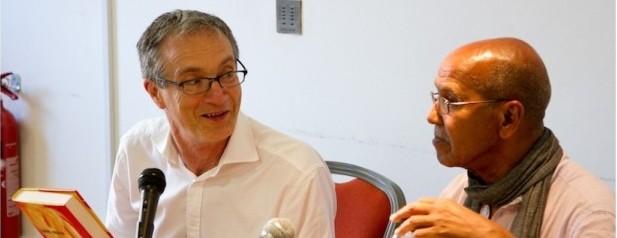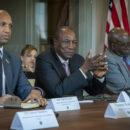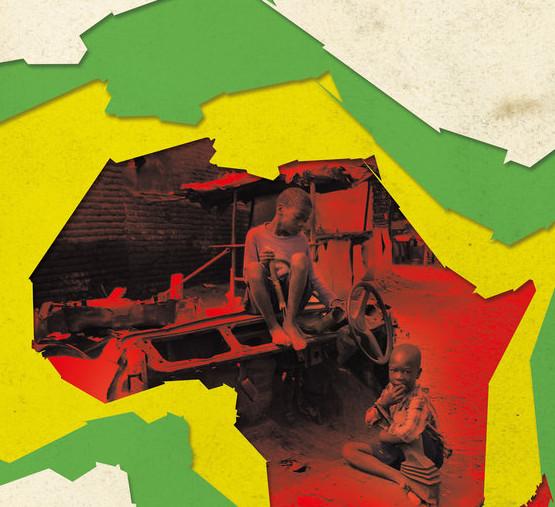Kenya after Westgate: more trouble ahead – By Richard Dowden

 What does the appalling attack on people at the Westgate Shopping Centre signify? Does it mean that Al Shabaab is getting stronger or weaker? Was it a show of strength, striking at a multinational target in the heart of Nairobi, or a desperate if spectacular attack on civilians at an easy, poorly-protected target? Is this the new Shabaab or was it an Al Qaeda operation using the Shabaab brand name?
What does the appalling attack on people at the Westgate Shopping Centre signify? Does it mean that Al Shabaab is getting stronger or weaker? Was it a show of strength, striking at a multinational target in the heart of Nairobi, or a desperate if spectacular attack on civilians at an easy, poorly-protected target? Is this the new Shabaab or was it an Al Qaeda operation using the Shabaab brand name?
Some of these questions may be answered if the Israeli Mossad interrogators get the surviving attackers to talk. Unlike Western interrogators, the Isrealis are not constrained in the methods they use.
Inspired by the Saudi Wahabist interpretation of Islam – ascetic, extreme, exclusive and violent – Al Qaeda feeds on despair rather than hope. It operates like the mafia, growing rich by terrifying wealthy Arabs into paying protection money. It transformed traditional Somali society by killing local imams or forcing them to abandon their traditional Sufi practices and Somali customs. For example, traditionally Somali women dressed in colourful flowing robes and played prominent social roles. Now they are dressed head to toe in black, dark brown or green and excluded from decision-making and debate.
But in places of extreme injustice you can see why such a millenarian religion might flourish. Somalia has had no government since the late 1980s and has been abandoned by the world from 1995 when the Americans fled and refused to fund the UN force too. Since then the south has been at war, there has been no state, little education or development, permanent insecurity and starvation. Millions have fled and a vast refugee camp, Dadaab, with almost a million inhabitants, has grown up on the Kenyan border.
After decades of clan warfare the people of Somalia rebelled against the warlords. For a brief period in 2005 there was peace under the Islamic Courts Union, some were Al Shabaab but others more moderate. However, Ethiopia (Somalia’s traditional enemy), decided they must be destroyed and invaded with American help, bringing back the warlords. That radicalised the courts and many young men were recruited by Al Shabaab, well-funded by the Saudis and Gulf states. But the Ethiopian invasion failed and an African Union force moved in. It began to push Al Shabaab off the streets of Mogadishu. In 2011 the Kenyan army invaded from the south and drove Al Shabaab out of the lucrative port of Kismayo. The movement was merely driven underground and into the countryside – a far less lucrative prospect than the towns in terms of tax and theft.
Shortly afterwards Shabaab formed an alliance with Al Qaeda. Until then Shabaab saw its mission as controlling territory and people in Somalia. Al Qaeda on the contrary believes in a messianic destruction of western power on earth and its replacement by Islamic law. Its tactics are to launch spectacular terror attacks on civilians. The movement became divided and Godane, closer to Al Qaeda than Aweys, organised a coup.
The background to the coup is well explained here.
The replacement of Aweys by Godane internationalised Al Shabaab and brought it out of Somali internal politics and closer to Al Qaeda’s global agenda. The Westgate bombing is the first manifestation of that.
In the short term what are the dangers? One would be that elements of the AU force and the Kenyan army take revenge on Somalis in Somalia, on the vast camps along the Somali Kenya border or in the traditional Somali area of Eastleigh in Nairobi. There are already scores of reported cases of brutality and rape by Kenyan police on Somali refugees. We know little of how the AU and Kenyan forces behave in Somalia and are regarded by ordinary Somalis there. In the mid 1990s almost every army of the 36 in the UN coalition in Somalia, Unisom – including even the Canadians – was accused of brutality or other crimes against civilians. It would be surprising if the African Union force is any more disciplined, particularly since many Somalis can be racist towards other Africans and reactive to armed foreigners on Somali territory, as I saw frequently during the American and UN occupation.
In these circumstances Al Shabaab, with its weapons and an ideology, might easily find willing Somali recruits or be able to force others to fight for it. But were they the killers at Westgate? Good liberals like myself believe that people who grow up in appalling circumstances, suffer hunger and sickness in childhood and see horrific things from an early age, can easily be persuaded to become rigidly ideological and violent themselves. But again and again in recent years the perpetrators of terror turn out to be young middle class kids from decent homes. It will be important to see the backgrounds of the attackers at Westgate.
What are the other consequences from this apart from the obvious ones like tighter security in Nairobi? These are my guesses:
- More attacks like Westgate in Africa, spreading to countries on the southern border of the Sahara.
- Renewed efforts to strengthen the Somali government in Mogadishu.
- Stoical resistance by the populations of Kenya and Uganda. No Somali pogroms.
- Tourists keep coming to both countries and their economies keep on growing but their populations become more enraged about the corruption of their ruling classes which have failed to protect them.
- Outside Africa – realisation that the real change must come in Saudi Arabia and the Gulf, but Europe’s dependence on its oil makes this difficult.
- And finally, the beginning of the end of the International Criminal Court. Western governments will need a stable strong government in Kenya. There is no way the West is going to allow President Kenyatta, who has shown good leadership qualities during the crisis (and his vice-president William Ruto), to spend months at a trial in The Hague and then go to jail.
Richard Dowden is Director of the Royal African Society and author of Africa: Altered States, Ordinary Miracles published by Portobello Books.







Nice article, summarises important points and gives unsensational logical predictions.